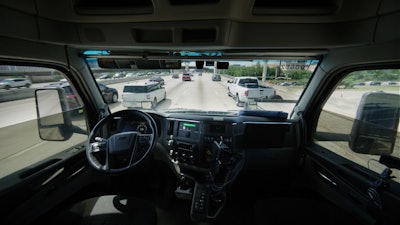
The autonomous trucking sector has taken another step toward making autonomous trucks widely available to carriers.
Self-driving truck developer Aurora has partnered with transportation management system provider McLeod Software to integrate AV technology into carriers’ existing operations and help increase industry adoption of self-driving trucks.
McLeod is integrating via API to Aurora’s technology, allowing Mcleod customers to tender loads and gain visibility into their autonomous operations.
An Aurora spokesperson told CCJ to think of it as an integration of the Aurora Driver App with McLeod’s existing TMS.
"Our partnership with McLeod marks a key next step in delivering a premium, customer-centric product and service," Ossa Fisher, president of Aurora, said in a news release. "By meeting customers where they are within their existing TMS, we're making it easy for them to tap into the safety and efficiency benefits of autonomous trucks."
One phase at a time
McLeod is not building a separate TMS to integrate with Aurora. The software provider is making a significant enhancement to its existing platform to include AV operations in a two-phase process that follows the path of autonomous development, said Ahmed I. Ebrahim, McLeod Software’s senior vice president of integrations and partnerships.
In the first phase, the autonomous developer typically collaborates with a carrier, using the carrier’s trailer but running the middle mile under the AV developer’s authority autonomously.
The partnership with McLeod enables that first phase, Ebrahim said.
McLeod has developed connectivity between its TMS and the Aurora technology stack enabling McLeod TMS users on the autonomous journey to perform processes like load tender and acceptance of autonomous shipments, dispatch and load visibility. That means McLeod customers can use the TMS to communicate with Aurora, directly within their existing system and workflows, for Aurora to run the middle mile on their behalf.
The next phase is when the customer will own the middle mile itself, operating the Aurora AV throughout the entire route.
“That has a different set of design and technologies we have to do between our TMS and the AV stack,” he said.
The design of the first phase is in progress right now with plans to roll out the new capabilities in 2026, with a customer currently testing the system in beta. The design for the next phase is also underway, Ebrahim said.
“Think of the AV stack as a mobile communication technology stack on higher grades of steroid,” he added.
The communication, such as load and shipper details, estimated times of arrival, etc. – that takes place today via a mobile communication device with a driver will take place between the TMS and the AV stack on the tractor, he said.
Adoption acceleration
Some carriers develop their own TMS, while others use existing options like McLeod, and some use on-prem systems versus TMS. An Aurora spokesperson said the goal with this partnership is to reach more potential customers and meet them where they are, giving them direct access to Aurora autonomous transportation capacity within their existing TMS for a seamless experience.
This partnership gives Aurora access to McLeod’s customers and makes it easy for them to onboard, manage and integrate autonomous trucks into their business. This could help accelerate industry adoption of self-driving.
“An essential part of adoption is ensuring autonomy can seamlessly fit within customers’ existing operations and transportation management processes without adding unnecessary complexity or friction. If there is unnecessary complexity, that is the barrier to entry,” the Aurora spokesperson told CCJ. “To that end, we’re putting a lot of effort into creating a way for carriers to manage a pretty technical asset so that it feels no more complex than managing a human-driven asset. We will work closely with McLeod and our customers to enhance the integration over time and what we can offer customers, like unique data points only AVs can provide.”
Ebrahim said the partnership gives McLeod a “first mover’s advantage,” so its existing customers can take advantage of the integration, but it also gives the company the opportunity to reach prospective customers that are seeking to adopt AVs.
McLeod customers are “intrigued – some willing to start piloting (AVs),” Ebrahim said.
But an Aurora spokesperson said this is not an exclusive relationship. The Aurora Driver is designed to support integrations with other TMS platforms.










